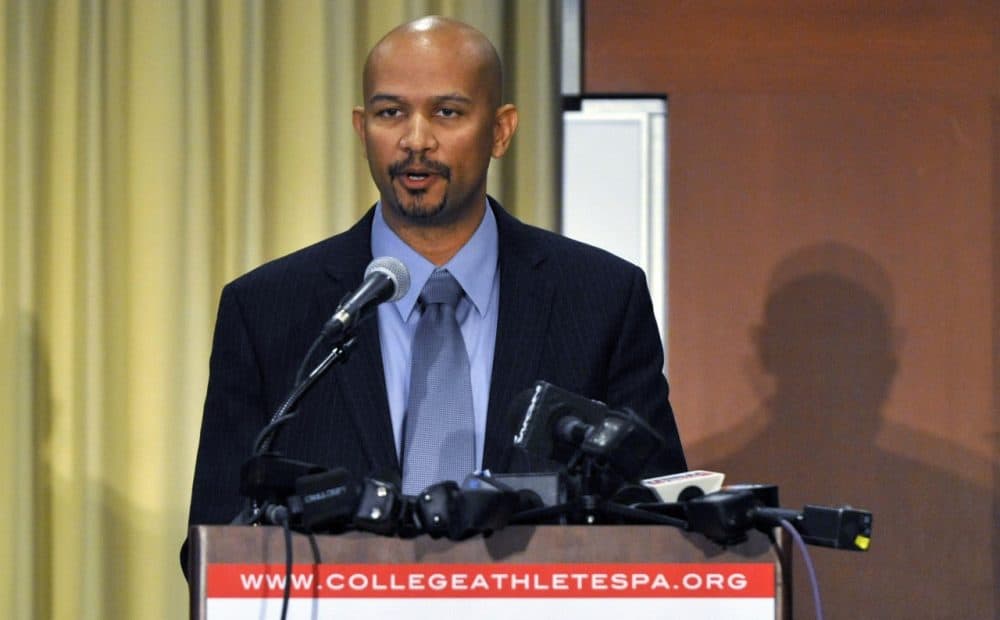Advertisement
Northwestern Football Moves Closer To Union
Resume
On Wednesday in Chicago, National Labor Relations Board regional director Peter Sung Ohr announced that the board considers Northwestern University football players to be employees. As such, they are entitled to form a union.
The College Athletes Players Association, or CAPA, was formed by Northwestern players, including former quarterback Kain Colter, to fight what they considered unjust NCAA rules. CAPA President Ramogi Huma joined Bill Littlefield.
BL: Mr. Huma, what’s your reaction to this week's decision by the NLRB?
[sidebar title="More On Northwestern" width="330" align="right"] Last month Sports On Earth's Patrick Hruby joined OAG to discuss the case. [/sidebar]RH: Well, obviously we’re pleased, but we’re not surprised. You know, we did our research. The United Steelworkers provided our lawyers. They’re some of the best lawyers in the nation. We knew that under NLRB previous rulings and the National Labor Relations Act that we had a very strong case, so we’re happy that Peter Ohr ruled in our favor.
BL: The NCAA continues to maintain that college athletes are first and foremost students. Why is that not the case in your opinion?
RH: The argument that we made is that for the university the reason why they have football scholarships is so they can have football players to have a football team. If you’re on scholarship and you walk away from the team, they take the scholarship away. So it’s not a gift for the football players for their education. It’s a payment in return for service, and it was very clear that we were able to make that point in the eyes of the law.
BL: Will the players at Northwestern wait for the full labor board in Washington to rule on the appeals from Northwestern and the NCAA to go forward with a vote?
[sidebar title="More Legal Battles For The NCAA" align="right"]In the latest lawsuit against the NCAA, sports labor attorney Jeffrey Kessler claims NCAA member universities are acting as a cartel. Sports Illustrated legal expert Michael McCann joins Bill Littlefield to explain the case.[/sidebar]RH: Actually, the regional director ordered a vote, an immediate vote, so that is done within 30 days of the ruling, so Northwestern football players made history, and they’ll make history again when they’re the first football team to have the option to vote on a union.
BL: Assuming the decision stands and the appeals are denied, what would the football players' union at Northwestern be asking for?
RH: They can’t ask for things that would violate NCAA rules, but under NCAA rules they can negotiate a collective bargaining agreement that guarantees expenses for sports-related injuries. You know, right now, every school in the nation, it’s completely optional whether they pick up any of the expenses if a player gets injured, especially former players.
They can negotiate for medical services from sports injuries for even former players. They can negotiate for protections to help minimize concussions. Even transfer rules. You know, if a player wants to transfer from one school to the next the school has the option to hold that player hostage which prevents them from getting a scholarship anywhere else and forces them to sit out. These are things that they can negotiate for under NCAA rules.
BL: Sometimes when a group gets an opportunity to go forward and organize and form a union, management says “OK, OK, let’s sit down and work this out.” Do you have any sense that that might happen?
RH: Well, in this case right here, Northwestern football players would have the right to negotiate with Northwestern. The conference and the NCAA, they are not the employers. Northwestern is the employer. Obviously they disagree with the decision that college athletes are employees with the right to unionize, but they’ve been very respectful with the players, and I think that they will abide by the law.
BL: The United Steelworkers, who as you say have paid for the legal costs of the football players' effort, released a statement on Wednesday, and it said, "This ruling is a tremendous victory for all college athletes." Do you have any sense of whether football players and other athletes at other universities are interested in organizing?
RH: You know, I’ve been advocating for college athletes’ rights for over 10 years, and I’ve been through countless locker rooms. I have a strong sense that this is something that players are going to want to do. The benefits that we’re talking about, the protections we’re talking about, they’ve been talking about for decades. And now they finally have some leverage, so I have no doubt that players across the nation are interested.
This segment aired on March 29, 2014.